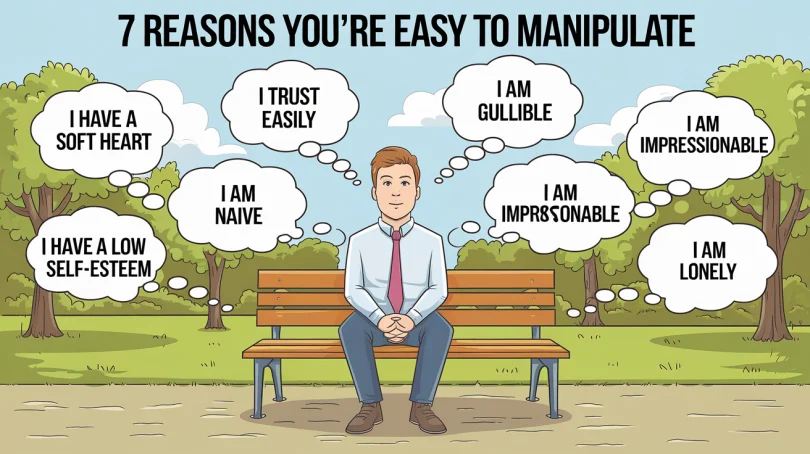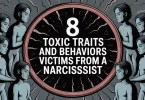In this article, we’ll dive into the seven most common reasons people are easy to manipulate and explore practical strategies to safeguard your well-being. Whether you’re a people-pleaser, struggle with low self-esteem, or simply want to strengthen your boundaries, this guide will help you take control and create relationships based on mutual respect, not manipulation. Let’s get started.
Reason #1: Your Empathy.
Empathy can be our superpower. It helps us put ourselves in someone else’s position, see things from their perspective, or imagine what it must be like to be them. That can be helpful and great it can allow our relationships to be closer and more connected. However, it can also make us more susceptible to manipulation.
If we can put ourselves in someone else’s position and see things from their perspective, we might find ourselves minimizing some of the hurtful or hateful things they’ve done or said. We might think, “Oh, they said their dad was rude and mean when they were growing up that’s why they’re doing this.” We might try to make sense of their bad, abusive, or manipulative behavior because we feel for them.
Related Topics:
Top 10 Reasons Narcissists Cheat: Understanding the Psychology Behind Their Infidelity
Tricks Narcissistic Parents Use to Paint You As The Problem
How Narcissists Try to Control You?
This can also cause us to feel sorry for someone. If we know something about their past, we might overlook bad behavior and engage in a relationship that we should have never started in the first place. We have to balance our empathy with self-protection. That doesn’t mean we can’t feel for other people, but it shouldn’t cost us our health, happiness, or safety in a relationship.
If we find our empathy causing us to minimize bad situations, overlook bad behavior, or try to make sense of abuse, that’s when it’s getting in the way. Instead of putting ourselves in their shoes, we need to get back into ourselves and recognize that the behavior happening to us isn’t okay. We have to protect ourselves from it maybe remove ourselves from the relationship or set a boundary. We can’t just see things from their perspective; that can put us in damaging situations.
If you find yourself being manipulated, it’s not your fault. These traits might make it easier for people to take advantage of you, but that still doesn’t make it your fault. It’s great to be empathetic just remember, you deserve relationships based on mutual respect, not manipulation.
Reason #2: You Want to Be Liked
Let’s be honest we all want to be liked. If we have a strong desire for other people to accept and like us, that can lead to people-pleasing behavior. Unfortunately, this can make us more vulnerable to manipulation. If we’re always looking outward, trying to make others happy, manipulative people will exploit that. They know they can get us to do things because that’s what we do.
As someone who’s recovering from this, I can confirm it’s true. I’ve found myself in situations where people took advantage of me because I have a hard time with people not liking me or being uncomfortable. I want to create comfort for others, which is my struggle. But that can make us more vulnerable to manipulation.
If you find yourself needing a lot of outside validation or feeling like you need to be liked by others, maybe you’re like me and struggle with people-pleasing behavior. Get into therapy to better navigate that, figure out where it’s coming from, and heal. Setting boundaries is also incredibly helpful. Understand that it’s okay to tell someone what they cannot do or say and then act on that.
Reason #3: You Have a Tough Time Saying No
This connects nicely to the last point. If we’re people-pleasers who need to be liked, we’re going to have a hard time saying no. We might feel like saying no lets people down, worry they won’t find someone else to do something or feel guilt-tripped. We might feel overly responsible.
Manipulative people will take advantage of this. They’ll lean in and think, “I know they won’t say no I can always get them to do what I need.” To better manage this, practice being more assertive. Learn how to speak up for yourself. Say, “I don’t have the time thanks for thinking of me.” One of my favorite outs is, “Thank you so much for thinking of me, but I’m not available.” That feels better than a flat-out “no.”
Find phrases that feel kind, caring, and authentic to you so you can use them more easily. Also, work on building your self-esteem. When we struggle to say no, it often means we don’t think highly of ourselves. Spend time doing things you’re good at to build confidence and feel more empowered to say no when needed.
Reason #4: You Overlook Red Flags
When we overlook warning signs and bad behavior, we become more vulnerable to manipulation. This is especially true for those of us with trauma in our past. If we grew up in a household full of red flags, those things might feel normal. For example, we might think, “People yell at each other all the time,” or “It’s normal for people to cuss you out when you don’t do what they asked.”
If we think bad behavior is normal, we’ll overlook it when we encounter it in others. This can also stem from the shame associated with trauma. If we think something’s inherently wrong with us, we might believe we deserve poor treatment or that it’s just the way relationships are.
If you struggle with this, it can be helpful to have a trusted person like a therapist, friend, or family member weigh in on situations. Ask them, “This felt a little off to me what do you think?” Healing from past trauma can also help us recognize hurtful or abusive behaviors earlier and trust our instincts.
Reason #5: You Struggle with Low Self-Esteem
If we don’t think highly of ourselves, we’ll look outward for validation, support, affirmations, compliments, and even guidance on decisions. When we lack internal direction, we become incredibly vulnerable to manipulation. Manipulative people will exploit this weakness because they know we’re looking for external validation.
If you struggle with low self-esteem, work on challenging negative thoughts. Use bridge statements like, “Maybe I’m not as stupid or ugly as I think.” Surround yourself with supportive, loving people who can help you thrive and grow.
Reason #6: You Avoid Conflict
When we’re conflict-averse, people can sense it. This means we might fear asserting ourselves, standing up for others, or taking a stance. Manipulative people will take advantage of this. If they know we’re a pushover or don’t like raised voices, they’ll use that to get us to do what they want.
While it’s okay to dislike conflict, being too passive can make us vulnerable. Practice being assertive and sitting with the discomfort of someone being upset. Role-playing with a therapist can also help build confidence in handling conflict.
Reason #7: You’re Too Trusting
When we trust people who haven’t earned it, we leave ourselves open to manipulation. Trust should be earned, not given upfront. If someone new in your life breaks your trust or does something hurtful, take that as an indicator for the future. Be cautious and give trust time to grow.
Remember, it’s okay to set boundaries, say no, and protect your well-being. You deserve relationships based on mutual respect, not manipulation. If you’re struggling with any of these issues, consider reaching out for support.







Leave a Comment